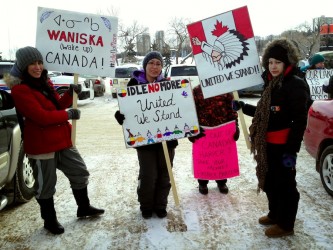Article Origin
Volume
Issue
Year
Online Exclusive
First Nations movement gathering momentum
The hunger strikes by Attawapiskat Chief Theresa Spence and Cross Lake Elder Raymond Robinson and the Idle No More movement are speaking to the same issue: the federal government must fulfill the promise of treaty and inherent rights for First Nations.
Spence has thrown her support behind the Idle No More movement, said Assembly of First Nations National Chief Shawn Atleo, who, along with the AFN executive, met with Spence on Dec. 20, 10 days into her hunger strike. He said she was “in good spirits (but) admittedly feeling weak.”
Atleo said Spence views the Idle No More movement as a strong stand by First Nations grassroots. Spence has called for First Nations to put aside internal conflicts and to stand united against the federal government’s conquer and divide tactics.
Spence has been joined on her hunger strike by Robinson, who took up the cause on Dec. 13. Atleo said he has sat in ceremony with Robinson since that time and the Elder is as committed as Spence.
Speaking prior to the Idle No More rally in Ottawa on Dec. 21, which Atleo attended, the National Chief reiterated Spence’s commitment to her cause, which she said is about more than Attawapiskat First Nation. In late 2011, Attawapiskat came to the national forefront when the federal government replaced Spence and council with a third-party manager after the First Nation declared a state of emergency because of housing issues. Spence challenged the government’s action in a federal court in 2012 and was successful with a judge ruling the federal government had over-reacted by appointing a third-party manager.
Spence is calling for the federal government to “commit to a meaningful dialogue to discuss engagement for implementation of treaty rights and inherent rights” before she will end her hunger strike.
The AFN sent an open letter to Prime Minister Stephen Harper and Gov. Gen. David Johnston on behalf of Spence on Dec. 16.
“We are reaching for an intervention from the Prime Minister to respond to this call, to end the hunger strike, and to follow up on Crown/First Nations gathering commitments (made) in January and to build on that as a first step, but to get to implementation, to truly transform and reset the relationship and move away from both unilateralism as well as respond to this human rights crisis,” said Atleo.
There has been no response from Harper to date.
Atleo said that the continuing conduct of the Conservative government has illustrated that there is a “deep division” between what First Nations want and what the federal government understands. That gap is widening, he said, as is evident by the United Nations human development index, which places Canada in the top 10, but ranks First Nations within Canada at 67.
“This is why Chief Spence has made such a dire action, that she’s willing to go so far, because the urgency runs so deep and that the efforts that the chiefs have been making to press for governments to uphold the honour of the crown have fallen far short,” said Atleo.
He said the Idle No More movement, which has held rallies across the country throughout December, is young people taking a stand and moving ahead with demands. The movement has also garnered international attention.
It is unclear, said Atleo, if peaceful demonstrations will continue to be “how we are going to give expression to what we’re experiencing in our lands…. There will be those who take direct action.”
A national strategy is being planned, coordinated by AFN Regional Chiefs Roger Augustine (New Brunswick/Prince Edward Island) and Stan Beardy (Ontario). That strategy will see action taken at the local, regional and national levels, depending on which chiefs and council want to do so, including in the form of concerted court campaigns.
Atleo also said coordinated action, spearheaded by individual chiefs in a manner he has never seen before, is beginning to happen and some of that action will include “very spontaneous” efforts on the front lines.
“It is a moment of perhaps great opportunity, but make no mistake, it represents that it is also a deep crisis,” said Atleo.
- 3911 views


